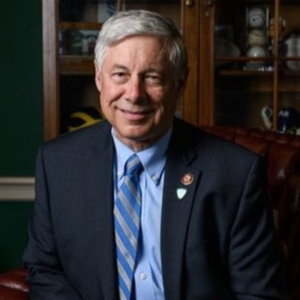Former Congressman Fred Upton Joins the Bipartisan Commission on Biodefense
FOR IMMEDIATE RELEASE  Contact: Steve AaronSRA Communications(717) 554-8614steve@SRACommunications.com
Contact: Steve AaronSRA Communications(717) 554-8614steve@SRACommunications.com
FORMER CONGRESSMAN FRED UPTON JOINS THE BIPARTISAN COMMISSION ON BIODEFENSE
Upton Brings Additional Bipartisan Biodefense Expertise to the Commission

WASHINGTON, D.C. (Feb. 7, 2023) – The Bipartisan Commission on Biodefense is pleased to welcome former Michigan Republican Congressman Fred Upton as a new Commissioner. Congressman Upton served his Michigan constituents since 1986, choosing not to seek reelection in 2022. He fills the vacancy created by the departure of Ken Wainstein who was confirmed by the U.S. Senate in June 2022 to serve as Under Secretary for Intelligence and Analysis at the Department of Homeland Security.
“We are so pleased to welcome Fred Upton to the Commission,” said Commission Co-Chair, former Senator Joe Lieberman. “Fred has literally written the book on bioterrorism preparedness and has been a strong advocate for the Commission’s recommendations within Congress. His insights will be invaluable as we work to update our National Blueprint this year.”
“I have appreciated Fred’s commitment to bipartisanship throughout his career, particularly on biodefense issues, and know he will bring that spirit of cooperation to the Commission,” said Commission Co-Chair, first U.S. Secretary of Homeland Security Tom Ridge. “While Chair of the Energy and Commerce Committee, he prioritized pandemic prevention and response, and I’m grateful for the expertise he will offer the Commission.”
In addition to writing Threat of Bioterrorism in America, former Congressman Upton also played a major role in the passage of the 21st Century Cures Act. Signed into law in 2016, the Act is designed to help accelerate medical product development and bring new innovations and advances to patients who need them faster and more efficiently.
Widely hailed as a tremendous success, the legislation not only revolutionized how the U.S. researches and develops new cures and treatments, it also included then Vice President Biden’s Cancer Moonshot Program. Upton was among the first lawmakers President Biden summoned to meet with him in the Oval Office to discuss his plan for creating a new DARPA-like agency to end cancer as we know it.
“We have learned the hard way about the real health threats to our way of life and need to leave no stone unturned as we face the future,” said former Congressman Upton. “This bipartisan effort can clearly make a difference down the road.”
About the Bipartisan Commission on Biodefense
The Bipartisan Commission on Biodefense was established in 2014 to conduct a comprehensive assessment of the state of U.S. biodefense efforts, and to issue recommendations to foster change. The Commission’s 2015 report, A National Blueprint for Biodefense: Leadership and Major Reform Needed to Optimize Efforts, identified capability gaps and recommended changes to U.S. policy and law to strengthen national biodefense while optimizing resource investments. Subsequent Commission publications have addressed critical needs for an Apollo Program for Biodefense, biological risk reduction, biodetection, agrodefense and the role of the land-grant universities, budget reform, diagnostics, critical infrastructure, and State, Local, Tribal and Territorial response capabilities. In September 2018 and in October 2022, the White House released the National Biodefense Strategy, and in January 2023, OMB released a biodefense budget crosscut, top recommendations from the Blueprint. In September 2021, the White House released the American Pandemic Preparedness Plan, taking up recommendations from the Commission’s Apollo Program and Athena Agenda reports. The Commission continues to address biodefense challenges and to urge reform. Former Senator Joe Lieberman and Governor Tom Ridge co-chair the Commission. Hudson Institute is the Commission’s fiscal sponsor.

